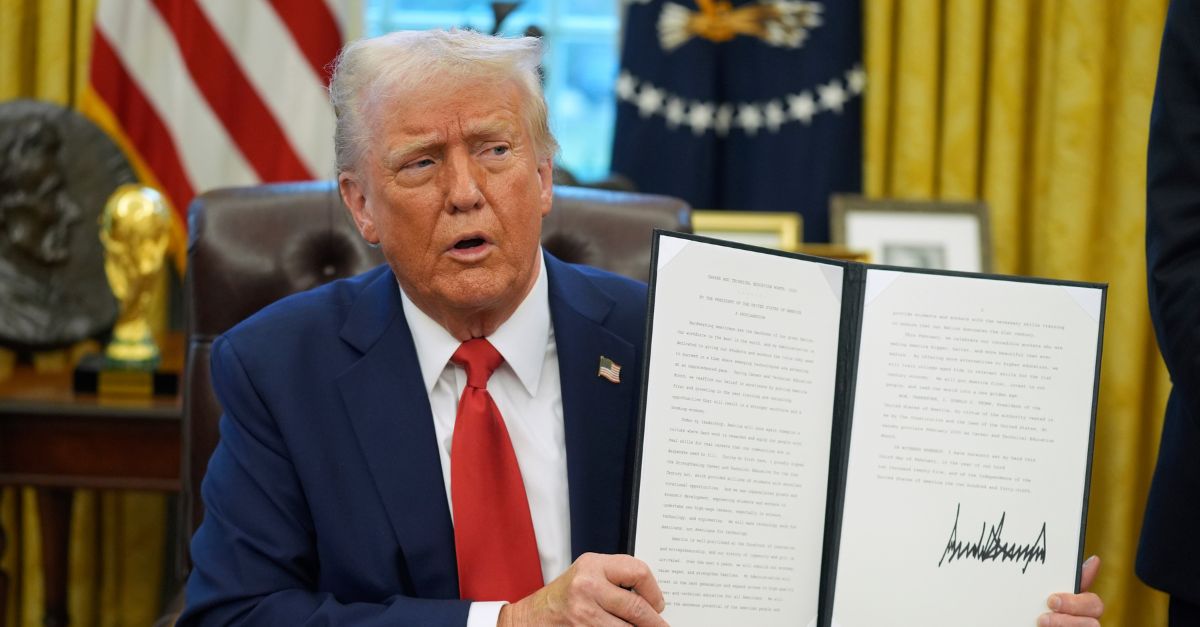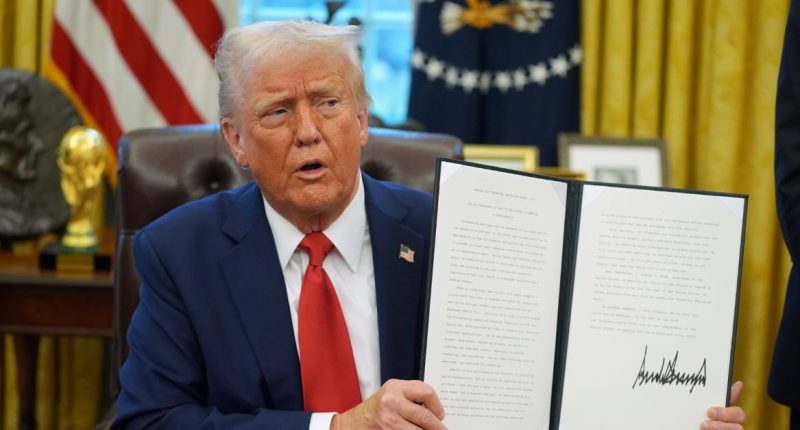
President Donald Trump holds up a signed executive order in the Oval Office of the White House, Monday, Feb. 3, 2025, in Washington (AP Photo/Evan Vucci).
A coalition of states suing Donald Trump over his executive order seeking to end birthright citizenship pushed back against the administration’s claim that the 14th Amendment of the U.S. Constitution was never meant to grant citizenship to individuals born in America whose parents were in the country illegally or temporarily.
In an 18-page filing submitted Tuesday, attorneys general representing Washington state, Oregon, Arizona, and Illinois argued that allowing the Trump administration to implement the measure would violate the U.S. Constitution and “return the Nation to a shameful episode of our history in which entire classes of people born on American soil are treated as undeserving of inclusion in American civic life.”
“That is the approach to citizenship embodied in Dred Scott that the people and the states rejected in ratifying the Fourteenth Amendment,” the filing states. “It is ‘undeniable,’ the Supreme Court has said, that the Citizenship Clause’s drafters ‘wanted to put citizenship beyond the power of any governmental unit to destroy. The Plaintiff States ask the Court to honor the Fourteenth Amendment’s promise and keep birthright citizenship beyond the power of the Administration to destroy.”
Upon taking office last month, Trump made good on his campaign promise to end birthright citizenship with an order directing the secretary of state, attorney general, secretary of homeland security, and social security commissioner to cease recognizing citizenship for children whose parents are in the U.S. illegally or in the country on a legal but temporary basis.
From the order:
“Policy. (a) It is the policy of the United States that no department or agency of the United States government shall issue documents recognizing United States citizenship, or accept documents issued by State, local, or other governments or authorities purporting to recognize United States citizenship, to persons: (1) when that person’s mother was unlawfully present in the United States and the person’s father was not a United States citizen or lawful permanent resident at the time of said person’s birth, or (2) when that person’s mother’s presence in the United States was lawful but temporary, and the person’s father was not a United States citizen or lawful permanent resident at the time of said person’s birth.”
The measure immediately resulted in a flurry of lawsuits from Democratic-led states, immigration advocates, and noncitizen pregnant women whose unborn children would potentially be left “stateless.”
Attorneys from Trump’s Department of Justice have defended the president’s order, arguing that the Fourteenth Amendment affords birthright citizenship to “those persons born in the United States and subject to its jurisdiction — and thus excludes children of noncitizens here illegally as well as children of temporary visa-holders.”
But the states on Tuesday asserted that the Trump administration’s claims fly in the face of history, precedent, and a basic understanding of the 14th Amendment’s guarantee of citizenship to all people born on U.S. soil, writing that “every branch of government has confirmed this understanding for the past 150 years.”
“Defendants’ counterarguments are meritless,” the filing bluntly states, adding that the defendants merely “re-hash well-trodden and widely rejected bases for attempting to adopt exclusionary views of the Citizenship Clause.”
According to the plaintiffs, the core contention of the Trump administration — that the children of illegal immigrants aren’t citizens because they’re not “subject to the jurisdiction” of the U.S. — is “a theory never before adopted by any court.”
“The Supreme Court, reviewing many of the authorities Defendants now cite, concluded that ‘the fourteenth amendment affirms the ancient and fundamental rule of citizenship by birth within the territory, in the allegiance and under the protection of the country, including all children here born of resident aliens,”” the filing states. “The only individuals understood not to be subject to the United States’ jurisdiction at birth were children born to diplomats or enemies during hostile occupation, those born on foreign ships, and those born to members of Native American tribes.” Native Americans were later made citizens through an act of Congress.
Allowing the administration’s order to be enforced would “grant them unchecked power to determine citizenship by executive fiat,” plaintiff’s argued, adding that the case is about “citizenship rights that are intentionally beyond the President’s authority.”
Attorneys for both sides will be in federal court in Seattle on Thursday for a hearing on the matter before U.S. District Judge John Coughenour. The Ronald Reagan-appointed judge on Jan. 23 issued a 14-day restraining order prohibiting the Trump administration from taking any steps in furtherance of the executive order after sharing some harsh words about the proposed measure, calling it “blatantly unconstitutional.”
“I have difficulty understanding how a member of the bar could state unequivocally that is a constitutional order,” he said. “It boggles my mind.”
A federal judge in Maryland on Wednesday issued a nationwide injunction blocking Trump’s executive order from going into effect following a hearing.
“The denial of the precious right to citizenship will cause irreparable harm,” U.S. District Judge Deborah Boardman reportedly said as the proceedings concluded. “It has been said the right to U.S. citizenship is a right no less precious than life or liberty. If the court does not enjoin enforcement of the executive order, children subject to the order will be denied the rights and benefits of U.S. citizenship and their parents will face instability.”






